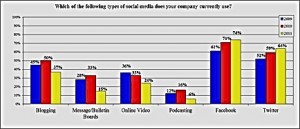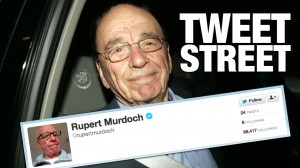“The modern chief executive lives behind a wall of communications operatives, many of whom ladle out slop meant to obscure rather than reveal.”
 |
| David Carr |
— David Carr of The New York Times lamenting the way many CEOs have long interacted with members of his profession. Not surprisingly, he lays the blame on communications professionals. The quote appears in his must-read column today on Rupert Murdoch’s sudden embrace of Twitter. More on that below.
He’s right, and wrong. Yes, the PR pro is charged with advising C-Suite executives on what to anticipate in a media interview, and how best to respond to journalists’ questions. Frankly, why should only the reporter’s editorial agenda be met? Shouldn’t the company also use the opportunity to advance its agenda? If not, why grant the interview in the first place?
And just as a good reporter will do some homework in advance of engaging a newsmaker, the better PR people among us will strive to wrap their arms around where a reporter’s journalistic proclivities will take the conversation. In fact, there is no shortage of ex-journalists making their livings as “media trainers,” though few of them directly interface with reporters to ensure that the goals of both sides of the media relations equation are met. (We take special pride in pegging reporter’s questions in advance.)
Obfuscation? Maybe in the eyes of the journalist, but from the perspective of the CEO, C-Suite or Board of Directors, this is a necessary step for advancing a company’s POV, let alone enhancing its reputation.
Mr. Carr does make a good point when he infers that the CEO has traditionally hidden behind the company’s communications (or general counsel as was more likely the case). This began to change a bit as corporate blogging took root. The CEO of Sun, vice-chairman of General Motors, founder of Zappos were just a few of the corporate chieftans who embraced blogging early on as a means to share their (mostly) unfettered musings. It was also a way to bypass journalistic scrutiny to speak directly to core constituencies.
 |
| UMass Study of Corp. Blogging Among Inc. 500 (’09-’11) |
Ironically, it was probably the company’s PR department that nudged their CEOs into this brave new medium, though a new study of the Inc. 500 by UMass Dartmouth indicates that corporate blogging may now be on the wane:
“Small businesses are backing away from blogging as a marketing tool and shifting to other social media outlets. Bye-bye, company blog—and hello, Facebook? The number of Inc. 500 companies maintaining corporate blogs has dropped.”
 |
| Rupert Murdoch (graphic via Gawker) |
Are they being replaced by shorter-form, and less time-consuming tweets? Perhaps. The catalyst for Mr. Carr’s piece was the unlikely embrace of Twitter by the octogenarian (and lately much beleaguered) CEO of NewsCorp, Rupert Murdoch. Carr writes:
“But, Twitter has the potential to cut past all that clutter. Given its ubiquity, there’s a chance to get a glimpse into the thinking of otherwise unapproachable executives, and sometimes even have a real dialogue with them. No one can be forced to use Twitter, but some people, even captains of industry, cannot resist.”
What’s ironic about Mr. Carr’s take on the PR profession is that the “flacks” he accuses of masking the company’s real CEO are again the same folks who advised Mr. Murdoch to take to the Twittersphere. The strategy was simple. After Murdoch was hammered in the media stemming from his appearance in the British courts and subsequent revelations, someone on News Corp’s comms team had an epiphany: let’s use Twitter to humanize him. It worked like a charm. Mr. Carr end his piece with this:
“Mr. Murdoch’s desire to be seen as a paragon of civility in any media realm, old or new, is rich. But give him credit for engaging in the world we all now live in and for not losing sleep over what pops out.”
Ironically, News Corp’s top communications officer resigned today. Was it the phone-hacking scandal or Rupert unleashed on Twitter? We’ll probably never know for sure.
very impressive!
term paper
The moment i saw your site was like wow. Thanks for putting your effort in making this article 🙂
term paper
<p>The moment I saw your site was like wow. Thanks for putting your effort in making this article.</p>